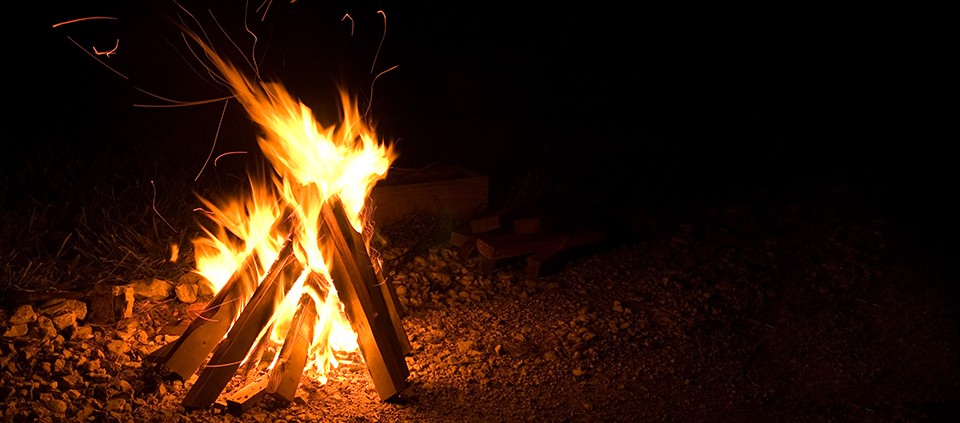Divine Force, Remover of Darkness: The Role of Fire in Your Health and Your Life

Recently, I had the opportunity to share a day with a dear friend who is nearing the end of his life’s journey after a valiant battle with lung cancer. We drove around together, doing ordinary things like grocery shopping, getting haircuts, and returning library books. When we got back to his house, I asked what he wanted to do next. His response: “Let’s build a fire.”
I thought that seemed a bit strange, but I went along with it. I split some logs while he got his flint and steel ready. Soon we had a roaring blaze, which felt satisfying and empowering. As we sat and watched the flames, I reflected on the role of fire and why my friend felt compelled to build one.
For millennia, fire has been an important tool for humans. The earliest recorded use of fire dates loosely to 800,000 BCE from archeological digs in northern Israel. In Vedic literature, the opening lines of the first sutra of the Rig Vega are “I laud Agni (fire), the chosen Priest, God, minister of sacrifice … lavishest of wealth … dispeller of night … radiant one.” The adjectives used in this opening verse underline the importance of fire to humans.
Divine force, remover of darkness, and provider are just some of the roles fire plays. Warmth, cooking, and protection can be added to fire’s list of important uses. In Rudyard Kipling’s The Jungle Book, the orangutan king coerces the man cub Mowgli to provide him with the Red Flower (fire) because, once he possesses it, he will be more man-like. In the same story, Mowgli uses the Red Flower to conquer the Shere Khan, the ferocious tiger. Despite the man cub not having fangs or claws to protect him, the power of the Red Flower proves an adequate tool for defeating the tiger. Whoever possesses fire also has power and can dispel darkness. Fire can create or transform, while it can also destroy.
In Ayurveda, the power of fire engenders health promotion and aids in disease management. It is the critical life force that selectively acts to transform or digest materials, thoughts, or emotions. It acts as the gatekeeper of life. With this ability to discern, agni determines which substances enter our cells and which should be removed. In doing so, it undermines darkness at many levels.
There are many subtypes of fire in the body; some authors describe 40 or more different agni, with jatharagni, our central digestive fire, as the cornerstone. All agni types share certain fundamental qualities: heat, sharpness, light, penetration, spreading, subtlety, luminosity, and clarity. In combination, these qualities govern many actions, including transformation, vitality, mental sharpness, intelligence, communication, enthusiasm, courage, and joy.
Keeping agni healthy remains the foundation of Ayurvedic therapy. To help stimulate agni, try the agni-building tea below, or try this recipe for an agni-building snack: Slice a couple of discs of fresh ginger, add a few drops of lemon juice and a sprinkle of pink salt, and eat before meals.
A warning comes with all fire: If you get too close, you will get burned. This is true about the digestive fire, as well. Too much—or too little—can produce disease. Finding the right balance for health is essential.
Whether it emanates from a roaring blaze or a single candle, the warmth, light, and protection provided by fire illuminates the path before us. Fire, man’s friend for millennia, is a guide for our transformative journey.
Agni-Building Tea
1 quart water
1 pinch cayenne pepper
¾ inch ginger root, peeled and then chopped or grated
1–2 teaspoons rock salt
2 tablespoons maple syrup or other natural sweetener
Juice of 2 limes
Combine all ingredients except the lime juice, and bring to a boil over medium heat. Simmer for 20 minutes. Cool for a few minutes and then add the lime juice. Keep the tea warm in a flask and drink it 10–20 minutes before each meal.
Find out about programs with Gerard C. Buffo at Kripalu.
© Kripalu Center for Yoga & Health. All rights reserved. To request permission to reprint, please e-mail editor@kripalu.org.
Gerard C. Buffo, MD, FACR, Dean of the Kripalu School of Ayurveda, blends his 31 years of experience in Western medicine with Eastern practice, teaching students, treating patients and researching ways to improve the delivery of care.
Full Bio and Programs